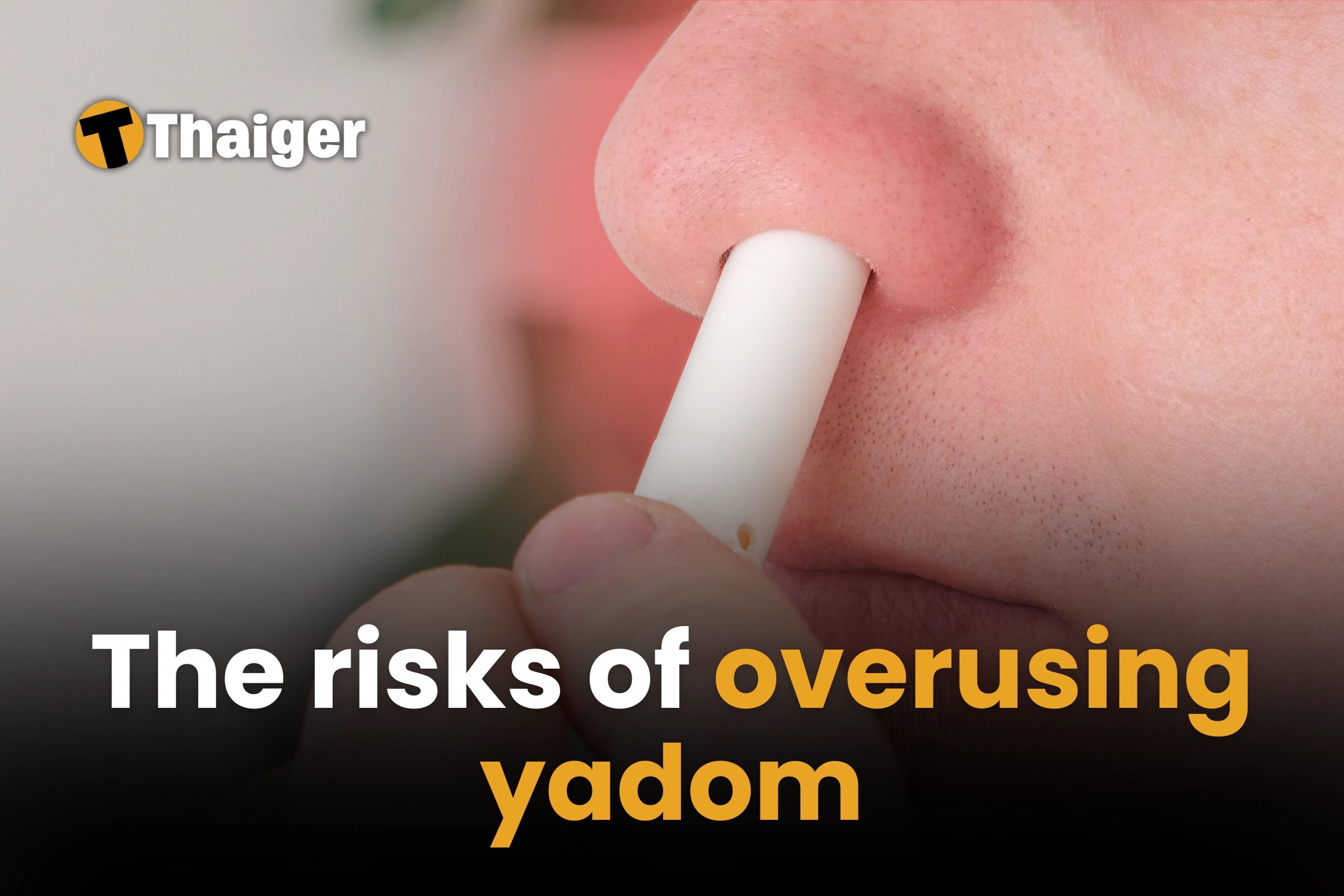The risks of overusing yadom

If you’ve spent any time in Thailand, you’ve probably come across yadom, the small nasal inhalers you see everywhere. While yadom is generally safe, there are some risks to be aware of if you’re using it often or if you have specific health conditions. This guide covers what you need to know about safe yadom use, including the potential downsides of overuse and health risks for certain conditions.
The risks of overusing yadom
It’s easy to reach for yadom throughout the day, especially in Thailand’s heat and crowded spaces. However, using it too frequently can have some side effects you might not expect.

Nasal irritation
Menthol, camphor, and eucalyptus, the main ingredients in yadom, provide that instant cool feeling, but they can also be harsh on your nasal passages with repeated use. Over time, you might notice dryness or even irritation in your nose. Some people report a stinging sensation or a dry, itchy feeling when they use yadom too much. It’s a bit like using too much nasal spray, where the lining of your nose can start to feel raw or overly sensitive.
Reduced sense of smell
Using yadom constantly means your nose is continually exposed to strong scents. This can lead to a dulling of your sense of smell, known as olfactory fatigue. Basically, your nose becomes numb to scents because it’s been exposed to menthol for so long. It’s temporary, but if you’re someone who relies on your sense of smell like if you love Thai street food or want to experience the aromas of local markets, overusing yadom could dampen that experience.
Psychological dependence
Many people get into the habit of using yadom to stay alert or relaxed, especially in the workplace. It’s a bit like drinking coffee, before long, you might find yourself reaching for yadom every time you feel tired or stressed.
While there’s no direct physical dependence, this habit can become psychological, where you start to feel like you need it to stay focused. It’s worth keeping this in mind, as a mental attachment to yadom might interfere with your natural energy or focus levels.
Health risks for specific conditions
Yadom is not just a simple inhaler, its ingredients can interact with certain health conditions. If you have a specific medical condition, here are some risks to be aware of.

Respiratory issues like asthma
For people with asthma or other respiratory sensitivities, yadom might cause irritation or trigger symptoms. Menthol can have a stimulating effect, which some asthmatics find irritating. It’s not the same for everyone, but if you have asthma, it’s best to test a small amount and watch for any reactions, like coughing or tightness in the chest.
Sensitivity or allergies to menthol or eucalyptus
Menthol and eucalyptus oil are strong essential oils, and not everyone can tolerate them. Allergic reactions can range from mild discomfort to more serious symptoms like headaches or nausea. If you know you’re sensitive to menthol or eucalyptus, it’s a good idea to avoid yadom altogether or try alternatives that don’t contain these ingredients.
Heart conditions
While yadom might seem harmless, its ingredients can have mild stimulant effects. For those with heart conditions or high blood pressure, even this small boost could be a risk. Menthol, for instance, can cause a slight increase in heart rate and blood pressure, so if you have a cardiovascular condition, you may want to check with a healthcare provider before using yadom regularly.
Tips for safe yadom use
Using yadom safely doesn’t mean giving it up entirely. Instead, try to use it only when you need a quick boost rather than as a daily habit.
- Limit usage: Try to reserve yadom for specific situations—like when you’re in crowded areas, or you genuinely need a pick-me-up. Limiting use to a few times a day can help reduce your risk of dependence and nasal irritation.
- Patch test for sensitivity: If it’s your first time using yadom, do a quick patch test by dabbing a little on your wrist to check for any allergic reaction. If there’s no irritation after 10 minutes, it’s generally safe to use. If you experience redness, itching, or discomfort, you may be sensitive to its ingredients.
- Explore alternative scents: If menthol and eucalyptus are too strong for you, some versions of yadom are made with milder essential oils, like lavender or lemon. These can provide a similar refreshing effect without being as intense, which might be more comfortable for sensitive noses.
- Try natural inhalers or essential oils: For those who want the effects of yadom without the ingredients, consider carrying a small bottle of natural essential oil, like peppermint or lavender, which you can dab on your wrists for a similar calming effect. These alternatives are often gentler and can be applied as needed without the risk of nasal irritation.
Interesting yadom facts you might not know
Yadom has actually been around for decades in Thailand, but its use has adapted with the times. What started as a simple remedy for stuffy noses is now almost a part of daily life. You’ll see yadom in taxis, offices, and even classrooms.
Many Thais associate yadom with a sense of comfort and routine, and it’s even been included in care packages sent to soldiers or healthcare workers. Some expats find it fascinating that yadom can almost be seen as a cultural icon, representing resilience in the fast-paced Thai lifestyle.
Another interesting point? Yadom might also have benefits in dealing with certain environmental factors in Thailand, like air pollution and allergens. Many locals believe that yadom helps them cope with Bangkok’s high pollution levels, as the menthol can make breathing feel a bit easier. While it doesn’t purify the air, the cooling sensation can be comforting, especially during the intense burning season in Northern Thailand.
If you’re an expat, yadom is likely one of those ‘only in Thailand’ products you’ll come to love. But as with anything, moderation is key. By understanding the risks and being mindful of any existing health conditions, you can use yadom safely and enjoy its refreshing benefits without the drawbacks.
Latest Thailand News
Follow The Thaiger on Google News:


























